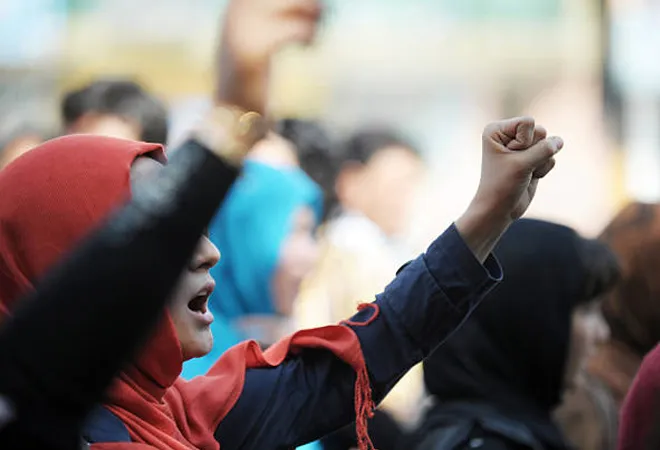-
CENTRES
Progammes & Centres
Location
The year 2022 has brought a death knell for Afghan women. The international community needs to act now.

Despite initially promising a more moderate rule, the Taliban has widely reasserted and practised a strict interpretation of Islamic law—since its seized power of the country in August 2021—systematically eliminating women from public life by depriving them of their most basic rights and freedom. This invisibilisation of women, nonetheless, gathered pace in 2022, where each passing day brought a series of bad news for the country’s female population.
And while, every new year brings a ray of hope along with fresh opportunities, even with the onset of 2023, women in Afghanistan continue to wage a lonely battle against the most oppressive, totalitarian, and arbitrary regime. It is perhaps time for the international community to go beyond mere condemnations and feel the moral responsibility to lend unequivocal support to Afghan women who are being denied the most basic dignity of life.
At the beginning of the academic year in March 2022, the Taliban reneged on its promise to allow secondary education to female students, depriving some 3.5 million girls of the opportunity to go to school.
Over the past 12 months of the new Islamic administration, women in Afghanistan—who have been raised in an era of relative opportunity and achieved significant progress in the past two decades—have been relegated to second-class citizens, with their fate and rights exclusively being decided by the male Taliban leaders.
For instance, at the beginning of the academic year in March 2022, the Taliban reneged on its promise to allow secondary education to female students, depriving some 3.5 million girls of the opportunity to go to school. During the same month, the Islamist Fundamentalists prohibited women from boarding domestic as well as international flights without a male chaperone.
Then in April, the Taliban stopped paying the salaries of the thousands of women government employees, who were fired and instructed to stay to at home with a promise of their salaries continued to be paid. In May, the de-facto administration issued a decree, ordering women to cover up in public from head to toe, including their faces.
Next, female TV presenters and journalists were required to mask up and cover their faces, making it extremely difficult for them to present news. Continuing their crackdown on women, the Taliban, in November banned Afghan females from entering public parks, funfairs, and gyms.
Their latest egregious curtailment of women's rights came in December with the Ministry of Higher Education instructing public and private universities to suspend access to female students immediately, depriving Afghan women of higher education. Merely a few days after, the group imposed a ban on women from working in non-governmental organisations (NGOs).
The Taliban stopped paying the salaries of the thousands of women government employees, who were fired and instructed to stay to at home with a promise of their salaries continued to be paid.
These initiatives have together helped the Taliban in reinstituting its hard line stance that the group maintained during its first stretch in power during the 1990s, taking both, Afghanistan and the Afghan women nearly three decades back.
But lest we forget, as per the international law, the Taliban leaders stand obliged to fully respect women’s right and freedom. And therefore, tolerating the group’s increasingly outrageous and discriminatory behaviour against women should not be an option for the international community.
The Taliban’s repressive actions have in fact, demonstrated that the group is not willing to change its policies based on the world’s denial to recognise them as a legitimate member of the international community despite the statements of its leaders repeatedly hinting at a desire for legitimacy and assistance.
It is thus, time for the international community to go beyond the practice of chorus condemnation and take a more punitive approach to improve the condition of women in Afghanistan. After all, in countries—including Burma, North Korea, Syria, etc.— where regimes are brutally violating human rights, the international consequences have been much more severe, especially in terms of the implementation of UN resolutions.
And in order to do this, the first crucial step that the international community needs to undertake is maintaining the flow of humanitarian aid and financial assistance without empowering the Taliban. In clearer terms, this means that the international stakeholders must ensure that Afghan foreign funds are being reserved for the benefit of the Afghan economy only, thereby, finding ways to prevent the Taliban from being able to access these funds.
Besides in the face of gross human rights violations, the international community must suspend all efforts to directly engage with the Taliban until there are meaningful and irreversible improvements in the rights and freedom assigned particularly to women. The global partners should, in fact, lay pressure on regional actors such as Qatar, Pakistan, and other Central Asian states, preventing them from giving any political recognition or support to the Taliban.
The first crucial step that the international community needs to undertake is maintaining the flow of humanitarian aid and financial assistance without empowering the Taliban.
Last but not the least, the international partners need to develop firm redlines and demands regarding human rights, especially women’s rights, and discuss the implementation of UN resolutions—such as the Responsibility to Protect or the Women, Peace and Security agenda—for the protection of the Afghan women.
Thus, even though it is true that the Taliban’s failure to keep their promises vis-á-vis women’s rights did lead to loud condemnation in world capitals, what the international community is currently offering the Afghan women is only a little more than pity. But in light of the death knell that the year 2022 has brought for the Afghan women—especially with the Taliban returning to its brutal policies of 1960s—
the international community must acknowledge and act on its moral responsibility to lend unequivocal support to the Afghan women, who are being denied the basic of dignity of life.
The views expressed above belong to the author(s). ORF research and analyses now available on Telegram! Click here to access our curated content — blogs, longforms and interviews.

Akanksha Khullar is a Visiting Fellow with the ORFs Strategic Studies Programme where her work focuses on the intersection of policy advice and academic research ...
Read More +